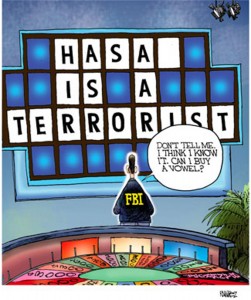Friends… And the Cause of Crime? (Part 2)

Does poverty cause crime?
Heather Mac Donald is a contributing editor at the Manhattan Institute’s City Journal, and she recently wrote an article for the Wall Street Journal that garnered quite a range of responses. Tom, over at Responsibility, was kind enough to send me a link. I think Mac Donald’s title pretty much covers the premise of her article: A Crime Theory Demolished: If poverty is the root cause of lawlessness, why did crime rates fall when joblessness increased? (WSJ, 20100104). This actually raises the specter of crime theories – there are a number of them. They are worth mentioning simply because the “root causes” notion of poverty is so well embedded in popular belief (even amongst law enforcement practitioners) that other theories are simply not a part of the conversation.
Perhaps the only theory (apart from “I’m poor, that’s why I…”) that is also a part of the vernacular is the so-called Classical Theory. I say “so-called” because criminal justice text-book authors have chosen that label. Essentially, this theory boils down to free-will, a choice. Though much is made of the “age” of this theory, there are plenty of modern day advocates (e.g. Stafford & Warr, Patternoster, Cornish & Clarke, and a few others) who have provided a new label: Rational Choice or Deterrence Theories. This newer version emphasizes the notion of a “costs v. benefits” analysis, but it still is heavy on the free-will concept. Those are just two theories that are a part of popular dialogue; however, there are a host of others that are not a part of our community conversation:
- Positivist – crime is caused or determined by biological, psychological, sociological factors. Claims to use science to determine the factors associated with crime.
- Trait Theory – this theory believes that criminals differ from non-criminals on a number of biological and psychological traits, and in conjunction with the environment… well, cause crime.
- Anomie / Social Disorganization Theory – as communities break down, informal social controls fail to control crime and criminal cultures emerge.
- Differential Association, General Strain, Strain, Control, Control/Balance, Feminist, Postmodernist, Chaos Theory…. You get the idea – lots. Most have some basis for deserving a portion of the “market share” he he he.
I’m a fan of eclecticism, because sometimes, one explanation just isn’t enough. Of course, people from both the right and the left say moderates are simply unable to get the fence post… So, let me remove the fence post from my posterior and say I think Mac Donald is right. As theories of crime go, I believe the notion that “the root cause of crime lies in the income inequality and social injustice” (WSJ, 20100104) has been thoroughly discredited. This is especially true if we remember the difference between causation and correlation. As comments and emails have made plain in response to the last post on this subject, while many readers doubt poverty is the “cause” of crime, they do believe it plays a part in the scheme of things criminal.
Thanks largely to Johnson’s “Great Society” brain trust, this particular brand of “root cause” theory was widely accepted and turned into public policy. These ideas did enough damage that some strange conclusions were drawn, as Mac Donald points out:
If crime was a rational response to income inequality, the thinking went, government can best fight it through social services and wealth redistribution, not through arrests and incarceration. Even law enforcement officials came to embrace the root causes theory, which let them off the hook for rising lawlessness. Through the late 1980s, the FBI’s annual national crime report included the disclaimer that “criminal homicide is largely a societal problem which is beyond the control of the police.” Policing, it was understood, can only respond to crime after the fact; preventing it is the domain of government welfare programs (WSJ, 20100104). (Added emphasis is emphatically mine.)
Despite what many on the left continue to claim, data-driven policing continues to be effective in combating crime. Mac Donald’s article is worth the read for that alone, because she amply demonstrates the effectiveness of the “Compstat” mentality and makes it plain that:
mentality is the opposite of root causes excuse-making; it holds that policing can and must control crime for the sake of urban economic viability. More and more police chiefs have adopted the Compstat philosophy of crime-fighting and the information-based policing techniques that it spawned. Their success in lowering crime shows that the government can control antisocial behavior and provide public safety through enforcing the rule of law. Moreover, the state has the moral right and obligation to do so, regardless of economic conditions or income inequality (WSJ, 20100104).
She follows this up with a warning, and it is prudent – crime rates could still be affected by public safety funding cuts driven by the recession.
With all that being said, I think it’s worth noting that Mac Donald still runs a little loose with her observations. Even if national crime statistics are better than ever, it is also true that there is a substantial positive correlation between poverty stricken areas and crime rates. The bottom line here is that crime tends to be heavier in low income areas than in more upscale neighborhoods. Using a national statistic to “demolish” a local phenomenon isn’t quite true to the use of those statistics – and Mac Donald should know better than to be that misleading.
I suppose the final critique here is that unemployment, the basis for Mac Donald’s tag line in the title, is NOT poverty. Consider the number of households with more than one income, the number of unemployment claims being filed, and the few who are sustaining themselves on odd jobs and savings – with those considerations in mind, equating unemployment with poverty at this point approaches being disingenuous.
Just in case you weren’t sure, I do believe crime is a choice. Having grown up in what passes for poverty here in the United States, I don’t believe it causes crime… though it does limit one’s choices. On the other hand, perhaps my grandmother was right (being a voracious reader, I’m sure she was quoting someone): “We’re not poor, we’re broke. Huge difference. Being broke we can change, being poor is a state of mind.”
P.S. Tune in next time when we show how engineering students living in Europe, waiting on their next check from home, were somehow living in squalor and utter wretchedness, and decide to fly a few planes into some buildings because they were… poor?
Cheers all!
 This was originally posted in 2007, and an email from a fellow blogger (
This was originally posted in 2007, and an email from a fellow blogger ( A tremendous body of advocacy writing concerning felony disenfranchisement spends its time comparing us to European countries and waxing long on our failure to be like them… Screw that, let’s be like us, and if we want to change the way we do business let’s keep it internally consistent! Let’s do it because it’s the right thing to do, not because somebody else is doing it. Sheesh!!
A tremendous body of advocacy writing concerning felony disenfranchisement spends its time comparing us to European countries and waxing long on our failure to be like them… Screw that, let’s be like us, and if we want to change the way we do business let’s keep it internally consistent! Let’s do it because it’s the right thing to do, not because somebody else is doing it. Sheesh!! I’m not so bold as to say all felons are democrats… because I know a few Independents that are ex-cons. Ha, you thought I was going to say republicans – all republicans are felons. Hahahaha. Seriously though, what do you think? Considering we have over 5,000,000 people unable to vote, doesn’t that have a pretty large impact on our notions of democracy – let alone the functioning of our democracy? What do you think?
I’m not so bold as to say all felons are democrats… because I know a few Independents that are ex-cons. Ha, you thought I was going to say republicans – all republicans are felons. Hahahaha. Seriously though, what do you think? Considering we have over 5,000,000 people unable to vote, doesn’t that have a pretty large impact on our notions of democracy – let alone the functioning of our democracy? What do you think?


